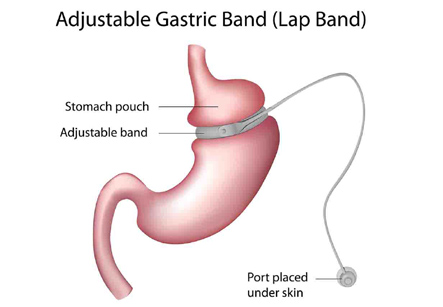Lap Band Surgery
Introduction
Lap Band surgery (Adjustable Gastric Band) or Laparoscopic Gastric Banding is a type of bariatric surgery that is prescribed to very obese patients, and it reduces the size of the stomach so that the patient feels full after eating small portions of food. It helps in the prevention of overeating and reduces the risk of further weight gain. Obesity affects millions of people worldwide and is often the root cause of other diseases like heart disease, diabetes, joint and bone diseases and even cancer.
The procedure
Lap band surgery can be done under general anesthesia wherein the patient is rendered unconscious during the operation; the surgeon makes small incisions and performs the operation under guidance of a small camera at the tip of one of the thin instruments.
We have all the information you need about public and private clinics and hospitals that provide weight loss surgeries in Iran, Islamic Republic Of with the best quality and lowest possible prices

A diet plan can be charted with the help of a dietician to supplement the required nutrients and prevent complications.
During the procedure the surgeon wraps the lower end of the stomach with a band like device, reducing the actual natural size of the stomach. The band is attached to a thin tube that is inserted right under the skin; this tube is then used to push in saline water that inflates the band as it tightens around the stomach. The saline water can be added or removed according to the tightness of the band.
This operation unlike other gastric operations for obesity such as gastric bypass or gastric sleeve is relatively less complicated and it is reversible.
Post operative information
After lap band surgery the patient is encouraged to move about to help heal rapidly, however heavy exercise or activities such as weight lifting should be avoided. In the initial two weeks after the operation the patient will be advised to take only liquids. A diet plan can be charted with the help of a dietician to supplement the required nutrients and prevent complications.
Solid foods can be introduced slowly and patients are advised to chew well and stop when they feel full because any amount of overeating may lead to nausea or vomiting. Once solids are introduced to the diet, the bariatric surgeon might insert saline water through the tube to tighten the band as it may require a few adjustments over the first year after the operation, to find the right balance.
Some associated risks and considerations
Lap band surgery is associated with risks like pain, bleeding, gall bladder stones, poor nutrition, anemia and blood clots that may get lodged into the brain or lungs, leading to life threatening complications. Many of these problems however can be addressed using appropriate prescribed medications.
Nutritional deficiencies may be corrected using vitamins and other food supplements, blood thinners may be advised to patients who are prone to getting blood clots.
Some severe complications include blockage of the stomach. Food may get blocked in the stomach, leading to pain, nausea and vomiting. Another occurrence is that sometimes the band may slip and get dislodged; this can be corrected either by a repeat operation or by removing the saline from the band.
Achieving weight loss after lap band surgery may be a slow process but with the appropriate diet plan and adequate lifestyle changes it is usually steady.